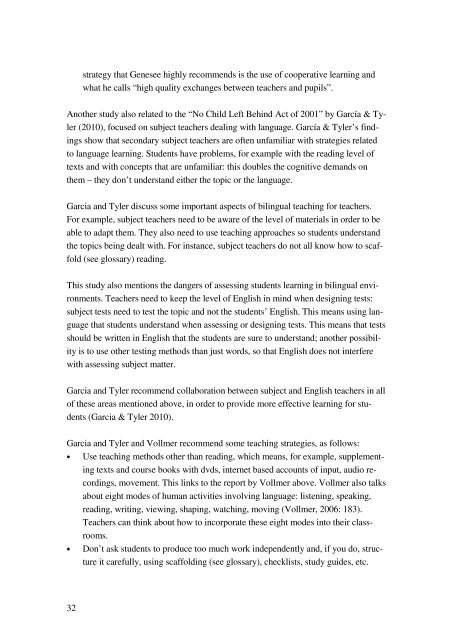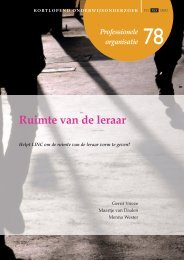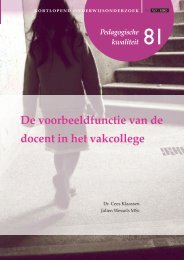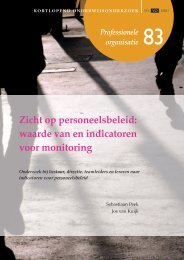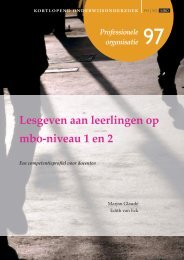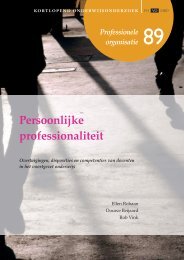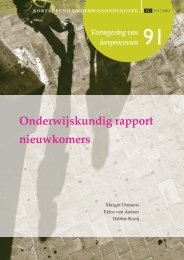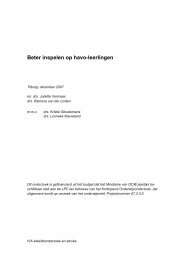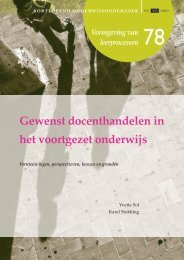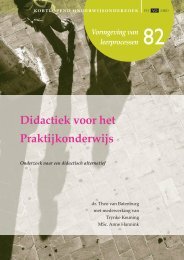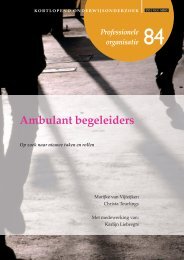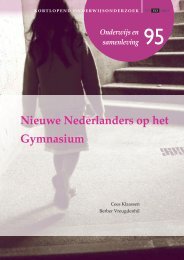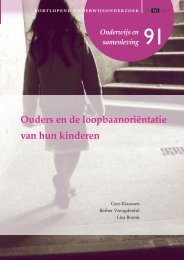Proud to be tvmbo - Kortlopend Onderwijsonderzoek
Proud to be tvmbo - Kortlopend Onderwijsonderzoek
Proud to be tvmbo - Kortlopend Onderwijsonderzoek
You also want an ePaper? Increase the reach of your titles
YUMPU automatically turns print PDFs into web optimized ePapers that Google loves.
32<br />
strategy that Genesee highly recommends is the use of cooperative learning and<br />
what he calls “high quality exchanges <strong>be</strong>tween teachers and pupils”.<br />
Another study also related <strong>to</strong> the “No Child Left Behind Act of 2001” by García & Tyler<br />
(2010), focused on subject teachers dealing with language. García & Tyler’s findings<br />
show that secondary subject teachers are often unfamiliar with strategies related<br />
<strong>to</strong> language learning. Students have problems, for example with the reading level of<br />
texts and with concepts that are unfamiliar: this doubles the cognitive demands on<br />
them – they don’t understand either the <strong>to</strong>pic or the language.<br />
Garcia and Tyler discuss some important aspects of bilingual teaching for teachers.<br />
For example, subject teachers need <strong>to</strong> <strong>be</strong> aware of the level of materials in order <strong>to</strong> <strong>be</strong><br />
able <strong>to</strong> adapt them. They also need <strong>to</strong> use teaching approaches so students understand<br />
the <strong>to</strong>pics <strong>be</strong>ing dealt with. For instance, subject teachers do not all know how <strong>to</strong> scaffold<br />
(see glossary) reading.<br />
This study also mentions the dangers of assessing students learning in bilingual environments.<br />
Teachers need <strong>to</strong> keep the level of English in mind when designing tests:<br />
subject tests need <strong>to</strong> test the <strong>to</strong>pic and not the students’ English. This means using language<br />
that students understand when assessing or designing tests. This means that tests<br />
should <strong>be</strong> written in English that the students are sure <strong>to</strong> understand; another possibility<br />
is <strong>to</strong> use other testing methods than just words, so that English does not interfere<br />
with assessing subject matter.<br />
Garcia and Tyler recommend collaboration <strong>be</strong>tween subject and English teachers in all<br />
of these areas mentioned above, in order <strong>to</strong> provide more effective learning for students<br />
(Garcia & Tyler 2010).<br />
Garcia and Tyler and Vollmer recommend some teaching strategies, as follows:<br />
• Use teaching methods other than reading, which means, for example, supplementing<br />
texts and course books with dvds, internet based accounts of input, audio recordings,<br />
movement. This links <strong>to</strong> the report by Vollmer above. Vollmer also talks<br />
about eight modes of human activities involving language: listening, speaking,<br />
reading, writing, viewing, shaping, watching, moving (Vollmer, 2006: 183).<br />
Teachers can think about how <strong>to</strong> incorporate these eight modes in<strong>to</strong> their classrooms.<br />
• Don’t ask students <strong>to</strong> produce <strong>to</strong>o much work independently and, if you do, structure<br />
it carefully, using scaffolding (see glossary), checklists, study guides, etc.


